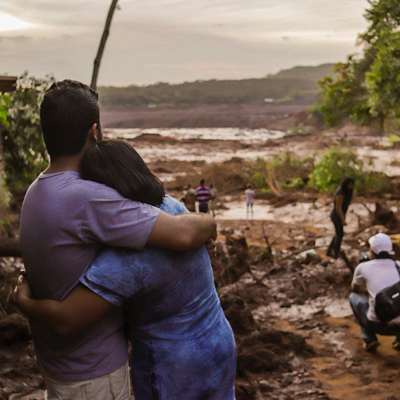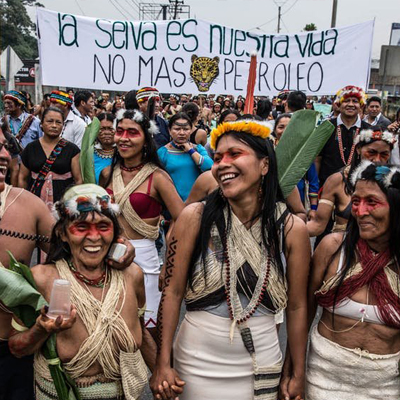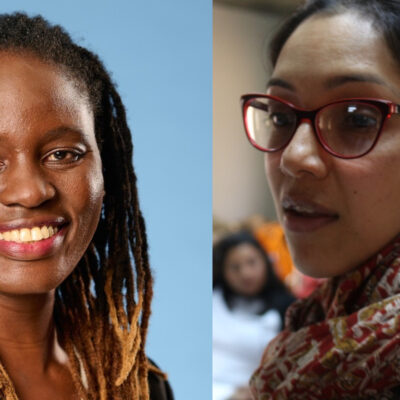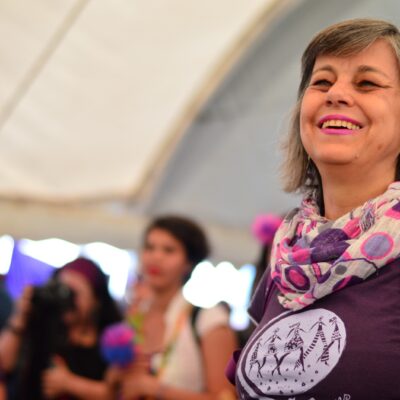How many more socio-environmental and human rights crimes until we say enough?
Public event against transnational power and impunity
 Movimento dos Atingidos por Barragens - MAB
Movimento dos Atingidos por Barragens - MAB
On 23 August, Friends of the Earth Latin America and the Caribbean (ATALC) together with social movements and organisations from the region held a public event in Tegucigalpa, the capital of Honduras, to discuss the urgent need to agree an international legally binding instrument on transnational corporations and human rights.
The goal is to gain the support of democratic governments in Latin America and the Caribbean ahead of the eighth round of UN negotiations for the Binding Treaty, a tool to address corporate impunity and provide affected communities with access justice.
Real World Radio interviewed the Economic Justice – Resisting Neoliberalism coordinator at Friends of the Earth International (FoEI), Letícia Paranhos. The activist highlighted that the UN Binding Treaty process started in 2014, within a context of progressive governments in Latin America and the Caribbean. Over time, following coups d’état and the neoliberal escalation in the region, “the document started to lose its soul, and became an empty document, a blank piece of paper.”
So, why is it important to put it on the table today? Leticia believes that “working up from the national contexts is important.” The shift to the left in several new governments in the region increases the chances of us advancing towards a “binding international document, no longer based on voluntarism, self-monitoring or corporate checklists.”
Why is a UN Binding Treaty on transnational corporations and human rights so urgent?
Dhaka in Bangladesh, 24 April 2013, the structure of the Rana Plaza building collapsed while 5000 people were working inside. The workers had warned that the building was in poor condition. 1130 people died and over 2000 were injured. Most of them were women. The textile workshops produced the garments found in the stores all over the world. Yes, most of them. The responsibility for this tragedy lies with renowned clothing brands, transnational fashion companies.
Brazil, Brumadinho, 24 January 2019, a dam with 12 million cubic meters of toxic mud collapsed, causing a massacre. 272 people died and more than three years later 11 people are still missing. As time goes by, the impacts are becoming clearer. Today it is estimated that approximately 1 million people were affected. Responsibility lies with a Brazilian transnational corporation, Vale who, having destroyed countless lives, ecosystems and communities, continues to operate with impunity.
In the Ecuadorian Amazon region, affected communities have been fighting for over 30 years for justice against transnational corporation Chevron, formerly known as Texaco, for to its countless crimes: releasing toxic water into rivers, daily oil spills (in six years there were over 900 spills in the Ecuadorian Amazon forest) and causing acid rain as a result of gas flaring. These are just some examples. Still unpunished, Chevron operates in over 20 countries globally.
The strategies used by transnational corporations to get away with these crimes are manifold: selling their assets and leaving the countries where they have caused disasters: paying minimal amounts in fines yet continuing to operate; political and judicial lobbying; criminalisation of the communities denouncing them; hiding behind nameless or faceless companies, or behind subsidiaries which take the blame for the parent company.
These strategies are part of the architecture of impunity that protects transnational corporations. Letícia referenced other strategies used: free trade agreements and purple/greenwashing. “Purplewashing – co-opting women – and greenwashing -market environmentalism – allow crimes to be compensated (according to the corporate logic) through corporate social responsibility.”
“Transnational corporations are at the centre of the system we want to change: the capitalist, racist and patriarchal system,” said Leticia, who is one of the speakers at the event in Tegucigalpa. “Laws are not everything, but they are another tool to ensurie the fight is more just,” she added.
What are the main demands in the struggle to stop corporate impunity through a binding treaty?
The social organisations that are part of the Global Campaign will be taking concrete proposals to the UN negotiations taking place this October in Geneva.
Leticia explained the demands:
- The “scope” of the Binding Treaty should be transnational corporations. This means not including all companies, so that the Binding Treaty specifically targets transnational corporations.
- The primacy of human rights over trade. No free trade or investment agreements should come before peoples´ rights.
- Direct obligations for translational corporations.
- Joint responsibility. This means that if an outsourced or subsidiary company violates human rights, the parent company should also be liable.
- Creation of an International Court that deals with cases of human rights violations by transnational corporations.
- Affected communities must be the subjects of rights in this Treaty.
- Protection against the corporate take over of the processes of preparation, negotiation and implementation of the Binding Treaty.
On expectations for the imminent round of negotiations, Letícia remains optimistic; s it is not going to be easy, but she trusts the “bottom-up” process and the strong legal arguments that have been built collectively. She stated that “it is fundamental to work with governments, so that they are aware of our proposals, because ultimately, States are the ones that can make changes in the proposals. They must understand that this could be a crucial regulatory framework, the first international regulatory framework on human rights and transnational corporations.”






